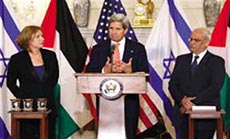
’Israeli’-Palestinian ’Peace’ Talks: A Waste of Time

Sarkis Abu Zeid
Amid Egypt's events that are deemed crucial as they reshuffle cards and freeze all "peace" plans if ever existing...and amid the headway of the Syrian crisis where neither the military nor the political solutions can come off anymore, something is happening in the Middle East, inaudibly, on the sidelines of current developments.
 It is the US movement State Secretary John Kerry is undertaking with such assiduity to revive the so-called "peace" talks between "Israel" and the Palestinian Authority. Kerry's political and diplomatic energy was remarkable and interesting. He has been to the region six times now ever since he assumed office last February.
It is the US movement State Secretary John Kerry is undertaking with such assiduity to revive the so-called "peace" talks between "Israel" and the Palestinian Authority. Kerry's political and diplomatic energy was remarkable and interesting. He has been to the region six times now ever since he assumed office last February.
This is what gave the impression that he might have something serious to offer and that he wanted to score an achievement in the region meanwhile, or maybe that he sought to offer diplomatic efforts in compensation for the US diplomacy's failure in Syria and involvement in Egypt, noting that the US has nothing to give to these countries, that are the most concerned with the stalled peace process, halted in Palestine and frozen in Syria until further notice.
In an assessment of Kerry's movement, a senior Palestinian official says that the Americans are failing in all regions: they messed up in Iraq, Afghanistan, Syria, Egypt, and elsewhere. And today they are messing up in Palestine." "Americans fail but they do not leave the scene. Instead, they keep buying time and managing crises because they fail to solve them," he says. He continues, "Even if we agree to return to negotiations, they will nonetheless be a waste of time because we know very well that Israeli Prime Minister Benjamin Netanyahu has no intention at all to reach a peace agreement and that his priority is to proceed with settlements."
In an "Israeli" evaluation, an opinion speaks of the 2013 strategy and says that US relation with the Middle East in general and "Israel" in particular may be a prelude to a certain change based upon the increasingly weakened US role in the world, which entails America to shed light on regions that are more vital to it.
Accordingly, many speak of US augmenting interest in the Pacific and East Asia as well as of a less important concern with the Arab Gulf and the Middle East. But this is absolutely not in "Israel's" strategic favor. Yet the problem today is that any "Israeli" government, especially the right-wing ones, is unable to be decisive on key conflicts like al-Quds, borders, or refugees. In addition, there won't be any US violation any time soon and almost nothing new will happen except attempts to adapt with the situation and keep away from facing major questions or even, best case scenario, attempts to reach provisional solutions.
In this very climate, the path of negotiations took off through formal pre-talks that do not tackle the essential matters in the conflict. Parleys will be restricted to administrative issues relevant to the place and schedule of negotiations and to whether they will be publicized or behind closed doors. Current talks are being held amid particular internal Palestinian and "Israeli" conditions and regional and international juncture that is more complicated than any time before:
- For the first time, negotiations on a final settlement are to be held while Palestinians are sharply divided, as those living in the West Bank and Gaza Strip are under two disparate rulings: one of them justifies negotiations while the other doesn't.
- For the first time, Palestinian negotiations with "Israel" are almost lacking effective Arab support as Arabs are busy with internal bickering. In fact, neither the moderate axis is able to back them, despite the presence of the so-called follow-up committee of the Arab [Peace] Initiative, nor the axis of the resistance is able to utter rejection or provide what is more than just a verbal support for the opponents of the settlement.
- In "Israel," far-rightists are controlling the government and key parties, disavowing whatever may lead to dividing the "land of 'Israel.'"
- The international reality cannot yield pressure on "Israel" to make the required concessions.
- "Israelis" believe that something may change if the Palestinian authority agrees to what it kept refusing all the time: reaching a provisional agreement instead of seeking a permanent solution.
- The US administration realizes that the complication is from the "Israeli" side, so it thought of solving it by building trust with the right-wing government and intended to appoint Martin Endyk, former US ambassador in Tel Aviv and head of foreign policy studies at the Zionist Brookings Institution think tank, as a Special Envoy for Palestinian-"Israeli" Negotiations, to provide suitable grounds for dialogue with rightist "Israeli" powers.
Moreover, the declaration to return to negotiations made no mention of the 1967 borders, deemed a key point in the conflict.
The way the US administration and both Palestinians and "Israelis" behaved as what happened was no breach is worth celebration...But Obama did not dash to celebrate the achievement, which led some observes to think the US president is being precariously pessimist.
Negotiations kicked off from Washington and they are more of a distraction to finish with the Palestinian Cause, at a time when mayhem and strife are engulfing the Arab world. They are aimed to cordon off the resistance which still threatens "Israel" and works for liberation, with Palestinian as its compass.
Source: Al-Ahed news, Translated by website team
Comments



